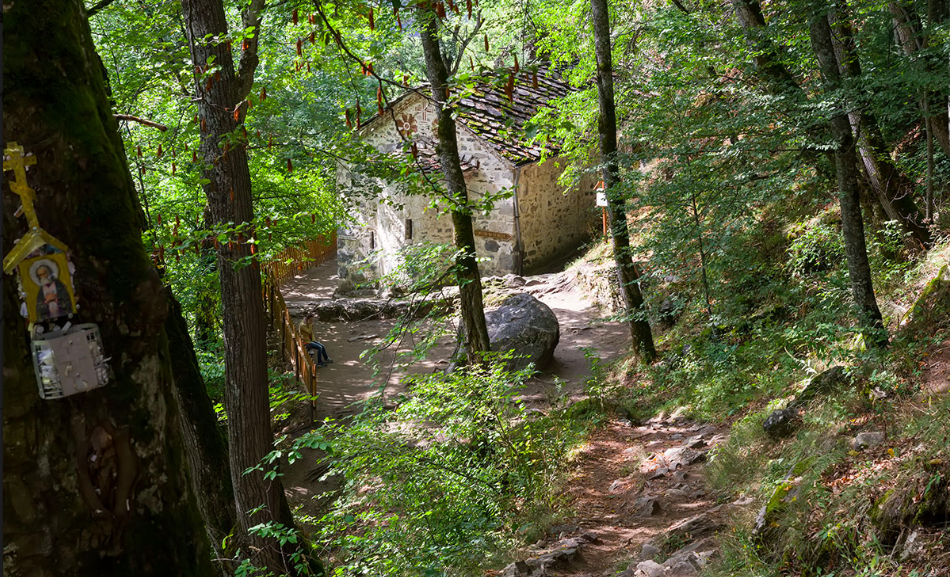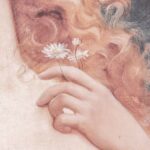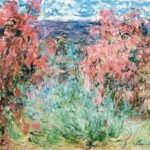Monastic life has always been something I’ve resonated with and felt close to. Perhaps because I am a bit more of an introvert, and perhaps because I believe the church is within – in the home of our heart, where we can retreat like in a little tiny monastery, shelter, cave, refuge – away from the hustle and bustle of life, and tune into what truly matters – the sacred land of our heart.
Being born and growing up in my native land Bulgaria, I’d often see monks because they are an essential part of the Bulgarian Orthodox Christianity, which is the main religion of Bulgaria since the 9th century. For those of you unfamiliar, the Bulgarian Orthodox church is similar to the Greek Orthodox and Eastern Orthodox ones – all of which are part of Christian Orthodoxy. Bulgaria has a rich and very old history as the first Bulgarian Empire was officially founded in the 7th century, and one of the earliest societies in the modern day lands of Bulgaria was the Neolithic Karanovo culture dating back to 6,500 BC.
I love traveling and often the beach and the sea are my final destinations, but during my travels I’d often make time on my way to visit at least one of many old monasteries throughout the country – tucked away in mountains, and also many made of stone and in caves along our sea shore. I remember once I even spent a night sleeping in a monastery, and for those of you who have done that as well, you know it’s an experience in itself. The cover photo is from Bulgaria’s Rila Monastery – and the picture is from the cave in which the founder of the monastery Saint John once lived.
In Christian Orthodoxy monks are very common and have been since around the second century. While many people may think of Buddhism when they hear the word monk, and I often share their own inspiring wisdom, today I’ll share with you some beautiful insights from the Christian Orthodox monks, also known as Greek Orthodox or Eastern Orthodox. I’ll share my own learnings as well as some insights from a beautiful monk that I recently came across – Father Seraphim Aldea from the Mull Monastery in Scotland. You can learn more about them and support their beautiful work and monastery at their official monastery website here.
I truly and wholeheartedly believe that these insights are applicable to our own lives, regardless of what religion or spiritual belief you have within you, and regardless of whether you live in big city or not. They can be applied towards leading a more fulfilled life as well as allow us an opportunity for a deepening and understanding of the essence of things.

Rila Monastery, Bulgaria
Self-honesty as the path for spiritual growth
The essence of a monastic life is one of a mystic – because a mystic seeks the answers and the truth within, walks the lands within, the mountains, the deserts, the jungles, the deep forests, the rocky paths, and explores the caves and lakes and rivers – and all he has is his lantern in his hand – which is his inner lamp, the flame, the fire. Christian Orthodoxy is actually very closely and deeply connected to ancient mysticism, and quite different from Roman Catholicism and other forms of Christianity, so for those curious and interested to learn more, you may research more about it.
There are things only for you to know, only for you to understand. And yet there are places within us, and within other partners and lovers, that will forever stay untamed, unknown, like wild lands. There are things we’ll never know in life because as human beings we were never meant to know it all, and the humility of this deserves to be treasured. Self-honesty is understanding this – knowing what is there to know and what we won’t know.
According to monks, the path towards spiritual growth is that of self-honesty, yet we need to be mindful that spiritual growth may not look like what we think. We need to be extremely honest about who we are, about our sins and failures and fears and doubts, and then from that honesty build ourselves. This is not to feel ashamed or judge ourselves, but to assess the situation and where we are in life and who we are at this point, and where we’d like to be. Change and growth can only happen when we have the humility to see and accept reality for what it truly is, and then the courage to move forward, imagine it otherwise, and take the steps forward, and put in the effort.
The way monks practice this self-honesty is through prayer – because they cannot put themselves before God if they are playing a role. Prayer is a very vulnerable thing, just like love is – which is why it requires this self-honesty and vulnerability and humility. Otherwise we cannot love, and we cannot be loved.
And when we are honest – when we open ourselves in such a tender and humble way – sharing our deepest part of ourselves, whether as prayer to God or as sharing your feelings towards a person – growth will inevitably happen.
We grow from self-honesty and humbleness, from vulnerability and acceptance – but know that spiritual growth can sometimes look like a failure to our world. It can look like some friends no longer being friends, it can look like no financial success, it can look like people judging you because you don’t have a normal job, it can look like you living a humble life, which people just don’t understand.
In the Western world, spiritual growth and financial success have become intertwined or correlated, which has never been the case in Eastern philosophy, mysticism and Eastern Orthodox Christianity. Across the media and social media, we are constantly shown the importance of the external world and validation; likes and followers determine whether someone is wise or not, and it’s yet another popular contest. I once saw a postcard which had Jesus on the front, dressed in his robe and carrying a smart phone, asking “Hey, will you follow me, I have only 5 followers.” This basically summarizes our modern world. And I wonder how much wisdom we are missing from those whose voices aren’t loud nor popular – how much we limit ourselves because of our own biases. But I digress.
What is important to understand is that spiritual growth gains spiritual rewards, not financial. So no matter the pressure, know that spiritual growth and financial success are not, and never have been, the same nor similar, at least in Eastern mysticism. This doesn’t mean that you will not be able to support yourself through spiritual work, but don’t think that your path is like someone else’s, and stay aligned to your intention.
As Father Seraphim Aldea said: “Don’t forget that the ideal of Christians is a naked man on a cross being killed by the people he actually healed and saved, and in our worldly terms he is basically the biggest loser, but in spiritual terms he is God.”
What does that mean for us in the context of our life? It means that the way you walk your path is only your own and only for you to understand because many people may not understand it. It means that your greatest treasures may not come in the way they would for other people or in the way even you yourself thought, but that doesn’t mean they are not coming or that you wouldn’t be blessed or taken care of. Sometimes people need time, or many years, until they see the truth and the light and the wisdom or love or compassion you might be sharing.

Glozhene Monastery, Bulgaria
Sin as fire for inner transformation
Let’s start with the word many people directly disregard because of its often dogmatic history. The true meaning of sin comes from the ancient Greek word ἁμαρτία meaning literally “to miss the mark” as in aiming for a vision or target and falling short. Our mark is usually one that marries clarity of mind, purity of heart and aligned with sincerity of action, so that we are aligned to our true intention, responding to the real internal need. But somehow, somewhere along the way, visions get foggy or waver and paths get shifted.
Sometimes it is because we didn’t have the tools needed, whether tools internal or external; sometimes it is because we didn’t have the awareness, understanding or maturity, or we simply didn’t pay attention to what we needed to. For whatever reason, we missed the mark. Perhaps the mark was love and emotional connection, but we fell into lust. Perhaps the mark was fairness, but we fell into greed. Perhaps the mark was courage, but we fell into anger or pride.
In the monasteries, monks spend part of their day in what is called obedience, which is essentially doing service to take care of the tasks of the monastery and the land etc. And these tasks are purposeful and unique to each monk depending on their own spiritual path. If a monk is struggling with pride in their life, they are usually encouraged to clean the toilets. If a monk struggles with gluttony, they may work most days in the kitchen yet not be allowed to eat or taste while cooking. These tasks are meant to align them in deeper inner harmony and inspire self autonomy.

Glozhene Monastery, Bulgaria
In our every day, we can all almost awaken our inner monk and learn things about ourselves from the opportunities that life presents us. For example, if you are stuck in traffic, perhaps you can learn about being more patient and less judgmental, and just be more self aware.
“Sins” aren’t things we should view as imprisonment or feel ashamed of them, because we are human and it is life, and we all miss some marks sometimes. But it is important to know ourselves and be aware of our reactions and temptations, and thereby develop self-autonomy, otherwise fears and doubts and low self-esteem will take a hold on us and drive us.
We can view sin, i.e. moments of anger, greed, pride etc., as a fire to be lit from within us – it is a fire that brings the beauty of the matter. Fire is an alchemist and is powerful. It can be used to burn – burn the whole house and ourselves – or it can be used to warm us and transform us in meaningful and very beautiful ways.
The lower we perceives ourselves, the more things we’ll want to do to wash away that inner shame or perceived sinfulness. So in a way, while we may think these sins are keeping us imprisoned or punished, they are actually an opportunity for that inner fire to inspire us to grow if we choose to. If we can allow the humility that arises within us from that “sin”, we can essentially allow these flames of insight and new found wisdom turn us into something beautiful.

Aladzha Monastery, Bulgaria
The essence and power of prayer
I talk about prayer often – and how to live your entire life as a prayer, which is essentially to live with purpose, intention and awareness. Prayer is a song of love. It is love. And just like love, it is sacred and private to us, and comes from the heart. In prayer, we open our minds and bodies and hearts in a way that is pure and true, and without expectation or demands – the purpose is only for us to become of deeper love and compassion, of deeper trust and faith – it is a connection, a bridge. It negates the boundaries of the rational and the logical, and we surrender completely – and that’s an act of faith and trust, which is essentially what love is.
For monks, prayer is a big part of their day. They have prayers with their brotherhood or sisterhood, but they also each have time for their personal prayer. And for them, prayer is a way to connect to God – because to know oneself, one needs to first know God. This comes from their belief that each one of us was created by God and in God’s image and light. So if you connect to God, and see God, and feel God, you will be able to know yourself and your essence more. You will gain a new appreciation of life, and of the virtues you seek to embody in this life, and align to. Prayer also teaches us patience, and humility. These are the gates towards true love, for patience is the mark of truest love, and without humility, how could love be sustained.

Aladzha Monastery, Bulgaria
In essence, prayer is the path of becoming.
Often times we seek outside for who we are, or what to become when we grow up, or how to be, or how to look like. The only way out is in – and you are already who you are meant to be, we just need to tune into ourselves and allow ourselves and allow God to shape us into what we were always meant to be and what we were created for. You cannot seek your image from outside, it is within you.
Life is not a path to become something “new” you see online or on social media or in the images of other people or in their projections on you or expectations of you or narratives of you, it is a path of becoming who you already are and developing this further in your unique way. And prayer helps you build that strong spiritual core within, and building that inner trust, trust in you and trust in God and trust in the divine timing of your life, and that hands will always be there to hold you, and that life will find its way to meet you with those you need on your path to support you.
The purpose behind icons
Icons are not something that the Christian Orthodox priests or monks use to “worship” nor idolize as images – and that’s often misunderstood.
Back in the day, icons were originally created as a language to portray the stories through images because many people were illiterate. And while they wanted to learn, they just couldn’t because they couldn’t read, so the stories were told through these paintings and iconography.
Father Seraphim Aldea described them beautifully, and what he shared was that icons are essentially a place of grace that you can enter – but they are only a gate, a window, a place you enter, they are not God and never have they been worshiped as such.
They are the glass, but they are not the ocean.
This shows us the importance of understanding the essence of things, and the meaning of things, rather than only look at the surface and then discarding it immediately. This refers to all of life.
And for scriptures and words also – we need to look deeper into the essence and meaning, otherwise we rob ourselves of deepening in knowledge, learning and we essentially limit our growth. When we look beyond the surface, we open up new doors – and new worlds, because words become worlds.
And then there’s another higher purpose to the icons: it is the importance of looking at beauty and sacredness because otherwise we forget it.

Icons reminds us of the sacredness of human life and the goodness and humility of people. Sometimes we forget what beauty is because all we see is ugliness around. We forget what a natural face because we live in a world of filters, fillers, potions and lotions and the falseness. We forget real human connection and the sacredness of life because we swipe human faces on apps, and say mean things behind screens forgetting that there is a human heart on the other side and we can’t see their tears when we’ve hurt them.
And then we get used to not seeing, not noticing, and unfortunately perhaps not even caring. In a world where almost everything is online and we are gaining knowledge from memes because attention spans are less than five minutes and we prefer not reading and not putting in the effort, and where even art and culture no longer serve to inspire us but almost dehuminize us or disempower us, we’ve become a bit too robotic, a bit too lazy, a bit too ungrateful.


Ivanovo Rock Monastery, Bulgaria
It is important for us to be able to see beauty, nature, human eyes – and whatever that means to you, whatever beauty means to you and whatever sacredness means to you and whatever inspires you through compassion and beauty of soul and heart – spend time looking at that. Our minds need it because sight is powerful and shapes us in thoughts, emotions, perceptions, and then habits, behaviours and actions. We can only perceive and see through the windows of our eyes, and if the view is foggy, all will be foggy.
Insights from asceticism
The literal meaning of asceticism is strong self-discipline and avoidance of all forms of indulgence. To apply this in non-religious ways, let’s understand its essence, starting from the rationale or purpose behind it. Part of it is fasting – and the rationale for a monk’s fasting is to cleanse and purify the body so that it becomes a match for the god-like virtues and for grace to live within us, and to be able to contain the higher consciousness.
Asceticism essentially gives the body glory, honour and the respect that it deserves. The body is a chalice. And depending on what you are filling it with, will become you. For monks, they view their body as a chalice for Christ – and they need to bring their body to a specific purified level to be able to contain and sustain that consciousness. In other words, they cannot be filled with lust, gluttony, excess etc., if what they seek is to be filled with the unconditional Christed love, which requires clarity of mind and purity of heart.
This is the same for all of us in the way that if we want something we need to be the right match for it. How can we love if we don’t have the inner emotional capacity to love? Where can love even breathe if there is no space for it because of selfishness, greed, fear, doubt, distrust? We need clarity of mind, purity of heart and sincerity of action – for things to happen, and not just “happen” but then be able to be sustained in our life. That’s devotion and commitment. And love itself requires integrity, faithfulness, dedication, and discipline i.e. responsibility and self-accountability.

Rozhen Monastery, Bulgaria
For the monks, they view the body to be just as important as the soul in this life. This is because this is a human life and our flesh and skin are what make us human beings. Otherwise we are only spiritual beings. So when we as spiritual beings are dressed in our human bodies, we become the marriage of flesh and heaven, a heaven embodied on earth, and our bodies become just as important as the soul.
This doesn’t mean be celibate – but it means have self-respect and be selective, don’t give yourself to all and everyone unless that’s your pure and true intention. Be mindful, conscious, love consciously.
The purpose of the body is also to show us that we need to not only imagine spiritual life, we need to do the actual work, to apply spiritual wisdom into our human relationships and live that through our gestures, words and hands. It means embodied love. So build love, contain love, emit love – in other words, walk the talk. You are not here to become spiritual, you already are – you are here to apply that spiritual wisdom towards your relationships, and hopefully, to stay aligned to your values and self-respect.
The sacrament of marriage
One of the most memorable and beautiful things that I learned from the monastic way with the Christian Orthodox monks is about the sacrament of marriage. And this might sound non-sensical, since they are monks, but entering into a monastery is quite similar to the entering of marriage – because both are about entering into a relationship. Both are considered a “sacrament”, and are ways in which we enter into a relationship for the purposes of developing the inner self – to expand the heart and grow the soul; to peel the layers of ourselves through devotion and uncover our true essence, thereby coming closer to our loving heart and thus, to God.
Father Seraphim Aldea shared his own story of becoming a monk – about how for many years before actually being initiated into and being blessed as a monk, he went through training and spiritual teachings, and his teacher would always ask him, again and again every few months: “Are you sure that this is what you want?” At the time he thought, well of course I do, I feel like I always have wanted that.
The teacher would still encourage him to take his time and make his decision wisely. Now that he’s been a monk for over 17 years, he shared how he’s had many moments in which he has felt unhappy, sad, even depressed sometimes. He shared how he’s had times of doubting if he had made the right decision, wondering if he should leave the monastery, wondering “what is the purpose anyway”, wondering if he is even connected to God or his beliefs anymore. And while all of these questions have pointed him back, inward, towards his heart for answers, it was still, and still is, sometimes difficult to gain clarity or suddenly feel ecstatic happiness.
But spirituality is not for the faint of heart.
Just like real love too is not for the faint of heart.

Troyan Monastery, Bulgaria
And this all brings me to marriage as a sacrament. In its essence, sacrament means a rite of passage, or an initiation by our own choice and free will, through which a sacred or spiritual power is believed to be transmitted through the channel of divine grace. This means: when we enter whether a marriage or a monastery, we enter into a relationship, which is a God’s gift to us, towards self-development. It is a path of devotion – and this is the only path which can allow us to come closer to our heart. And it is the heart that is the initiatory pathway towards higher consciousness.
If we can sum up the spiritual atmosphere of the mid-20th century in one phrase it’d be that: spiritual fruits are desired and expected to come to us without the spiritual labour necessary of us to attain them.
And this mindset of the collective consciousness has translated into all areas of our life, including relationships and work also: we expect something while giving nothing; we take without giving back; we have spoiled ourselves to free knowledge online without the time and effort necessary to earn it; and we swipe human faces on apps reprogramming our minds to think it is always greener on the other side. We have forgotten that love and intimacy require daily efforts and a sense of deep reverence.
Devotion is not an easy thing. Think of having your own business: how many days you wake up and not feel motivated or “divinely inspired” and yet you chop wood, carry water. Step by step, little by little, and we awaken patience, responsibility, self-compassion, and trust in something bigger than us. We begin to see that it is not just compromise in a marriage that needs to breathe, there is sacrifice. There is selflessness. There is effort. And there is occasional sadness of the parts of us that no longer are, in us and in our partner; the dreams that never became; and the dreams that may never be. In devotion, trust awakens, patience awakens. And patience is the mark of truest love; patience is what opens the soul of matter.
Whether we choose a monastery, a marriage, a relationship, a garden, a business – these are all pathways demanding devotion for the purposes of spiritual development. It is the cross we choose to carry in this life from which to learn and grow. And no matter how spiritual or self-developed we are, there will always be moments when we’ll find ourselves in the dense forests – unknowing, doubtful, wondering what is the purpose of this all? And that’s okay. We were never meant to know it all anyway. There are cycles of the land; just as there are cycles of the physical, emotional and spiritual wild lands within us – the landscapes that we are.

For more of my writings, browse through my Art of Love.
If you wish to support me and my work, you may do so by sharing it or donate here. For personal readings with me, you may visit my Offerings.
Your support means so much to me! Thank you wholeheartedly!




